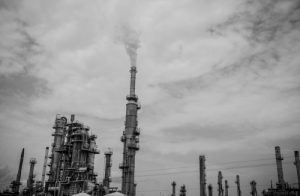The case against EPA’s effort to freeze the Agency’s June 2016 New Source Performance Standards (NSPS) imposing air pollution controls the oil and natural gas (O&G) industry expanded when the attorneys general (AGs) of 14 states and the city of Chicago filed a motion to intervene on behalf of the plaintiffs, five environmental groups.
“State Intervenors have unique interests in the outcome of this case that may not be adequately represented by Petitioners, and State Intervenors are uniquely situated to explain the burdens and harms of staying the 2016 Rule on those State interests,” say the AGs in their motion.
Rule and industry petition
The 2016 rule established NSPS for emissions of greenhouse gases and volatile organic compounds (VOCs) and included requirements to control fugitive emissions at well sites and compressor station sites as well as emissions from pneumatic pumps. In addition, for centrifugal compressors, reciprocating compressors, pneumatic pumps, and storage vessels, the rule requires that a professional engineer (PE) certify the closed vent system design and capacity as well as any technical infeasibility determination relative to controlling pneumatic pumps at well sites.
The NSPS became effective August 2, 2016. Several months after the EPA promulgated the regulations, industry petitioners requested that the Agency reconsider the rule’s fugitive emissions requirements, well site pneumatic pump standards, and PE-certification of closed-vent systems. Among other things, petitioners claimed that these requirements differ significantly from what the EPA proposed, thereby eliminating the opportunity for the public to comment on issues such as technical feasibility and cost.
The industry complaints made headway with EPA administrator Scott Pruitt. This month the EPA issued a 3-month administrative stay of the NSPS and two proposals that could stay the standards for an additional 27 months. The Agency says it needs this time to reconsider the final requirements.
Proposal was complete, say groups
In their suit, the environmental groups assert that there is no truth to the claims that the public had no opportunity to comment on the issues under contention. “Each of the objections cited by the Administrator as the basis for reconsideration could have been (and in fact, was) raised during the public comment period,” state the groups. “And each complained-about provision of the final rule was a logical outgrowth of the proposed rule and responsive to the comments actually made. There was no last-minute surprise or course change that commenters could not have anticipated. Consequently, there was no proper basis for reconsideration, nor for a stay.”
Impact of stay
In their motion, the AGs focus on the consequences of delaying the standards.
“As a result of the Administrative Stay of the [leak detection and repair] program, more than 18,000 new or modified oil and gas wells—and any additional new wells currently under development—will not be required to inspect and repair leaks of these pollutants,” the AG motion states. “During the 90-day term of the Administrative Stay, this will result in at least 5,349 tons of methane, 1,475 tons of VOCs, and 56 tons of hazardous air pollutants emitted that, but for the Stay, would have been controlled and prevented. These additional emissions will harm the State Intervenors’ interest in protecting their residents from the effects of harmful air pollution and climate change.”
The motion also looks at the impact of the 90-day stay in individual states. For example, the motion claims that the administrative stay in New Mexico will affect 1,500 wells that will emit 873 tons of methane, 238 tons of VOCs, and 9 tons of hazardous air pollutants during the 90-day period.
Furthermore, say the AGs, under the proposed 27-month stay, experts predict that at least 48,000 additional tons of methane, 13,000 tons of VOCs, and over 500 tons of hazardous air pollutants will be emitted that would have been prevented by the 2016 rule.
In addition to the city of Chicago, the petitioning AGs represent Connecticut, Delaware, the District of Columbia, Illinois, Iowa, Maryland, Massachusetts, New Mexico, New York, Oregon, Pennsylvania, Rhode Island, Vermont, and Washington.

